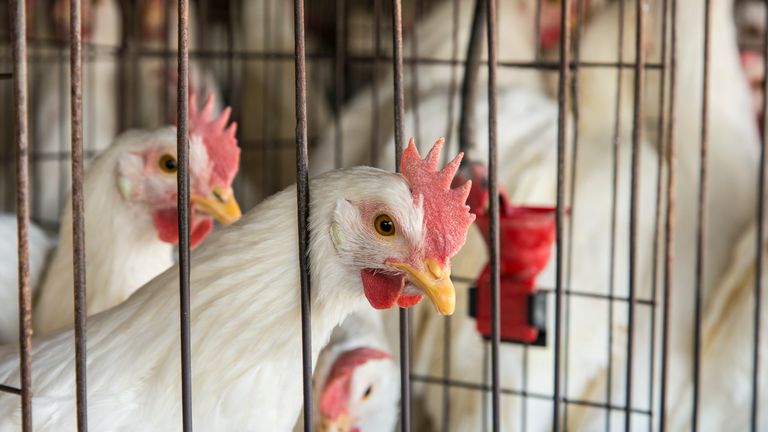Sky Views: UK risks being animal torturers

Monday 27 November 2017 20:00, UK
Sam Kiley, Foreign Affairs Editor
The calves stood motionless. They had no choice. Their heads were held between steel bars, forcing them to seek the only respite from agony they could - to eat.
This was a veal calf unit in the 1970s. I visited these places of mass animal abuse and torture with my mother who was commissioned to investigate whether, scientifically, factory farming caused animals "suffering".
The extent and type of suffering - emotional as well as physical, was painstakingly researched over months and years.
Pigs ate their tails off, ate their young, went mad and screamed for days on end. Cattle bashed their heads until they bled.
Yet all this was, at the time, ignored. After all, it was more profitable and easier to swallow the Judeo-Christian notion that mankind had been given dominion over the earth and the Cartesian obscenity of the bete machine, the unfeeling beast.
It was obvious to me as a kid - and it is obvious to anyone who has owned a dog, visited a zoo and anyone with any remote capacity for empathy that of course animals feel. They feel pain and they feel emotion. How complex the latter we don't entirely know. But there is plenty of evidence that animals can think.
Research by Joyce Poole and Cynthia Moss has revealed complex social structures, communications, a capacity for grief and much joy among elephants. Studies of octopuses reveal animals of rare intelligence, a capacity for problem solving and possibly even a sense of humour.
Corvids use tools, develop friendships. The great apes have been taught American sign language, have shown they are able to construct sentences in a foreign language (ours), and share more genetic material with humans than a horse does with a donkey.
Now read this clip from The Independent: "MPs have voted to reject the inclusion of animal sentience - the admission that animals feel emotion and pain - into the EU Withdrawal Bill."
This EU legislation did away with the worst forms of factory farming - improving animal as well as human welfare by reducing the level of antibiotics and other pollutants that are found, say, in American meat and find their way into the human body.
It was not a load of hippy anthropomorphism that drove the EU to accept that animals could feel pain - that they were sentient, thinking, creatures. It was the steadily evolving science of animal behaviour that unsentimentally revealed what any layperson in contact with animals has known for millennia.
But we now live in an age where neither science nor common sense let alone decent human sentiment matters.
What matters is that the Government has quietly dropped the very simple idea that the UK could simply copy existing EU animal welfare legislation based on the idea that animals are not machines into British law. EU standards are, after all, the benchmark worldwide for best practice both morally and in terms of human health.
Now why would the UK do this?
Simple. Allowing EU standards to define the UK's would exclude many American meat products from the UK market.
Could it be that Michael Gove, the Environment Secretary, who is seen as an avid neoconservative and who believes that a trade pact with Washington would be a better alternative to membership of the EU, is preparing this country to handle the demands of US trade negotiators?
If so then Britain has to be made less ethical in its treatment of other beings and less healthy in its treatment of its own citizens.
We will become unique in Europe as a nation that once thought of itself as one of animal lovers transformed into the continent's pre-eminent animal torturers.
:: A DEFRA spokesperson said: "We recognise and respect that animals are sentient beings and should be treated accordingly. There will be no watering down of the importance we place on animal sentience after we leave the EU. As ministers explained to parliament last week, we will consider how we might explicitly reflect the sentience principle in wider UK legislation."
Sky Views is a series of comment pieces by Paste BN editors and correspondents, published every morning.
Previously on Sky Views: Ed Conway - Hammond Budget makes for dangerous cocktail



